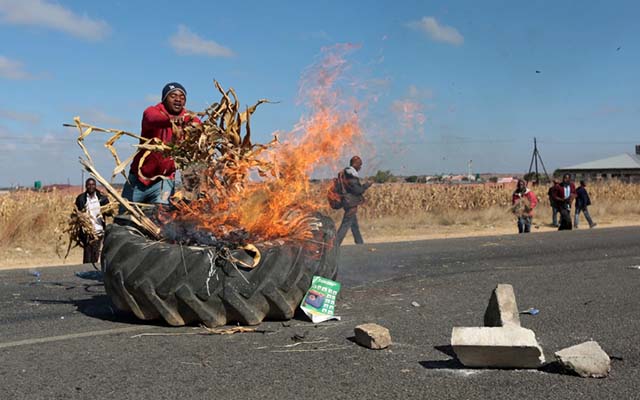Understanding the recent law and order disturbances

Saul Gwakuba Ndlovu
Zimbabwe has recently experienced some law and order disturbances triggered mainly by two developments: one, a government measure, Statutory Instrument 64 of 2016 requiring traders to procure import licences for goods they bring into the country for resale, and two, corruption allegations against some government officials, particularly traffic police.
The statutory instrument is a new government measure aimed at protecting Zimbabwe’s manufacturing industrial sector from foreign products that have flooded the local market place and are sold at much lower prices than locally made wares.
Corruption allegations against the ZRP traffic section have been in the news for a quite long time but not much has been done to combat it. Instead, the section has drastically increased the number of road blocks throughout the country.
Police officers manning the road blocks ask motor vehicle drivers to show them drivers’ and vehicle licences, insurance papers, spare wheels, jacks and fire extinguishers. In addition, they examine each vehicle for road fitness.
Allegations are that if they find a fault, they usually demand monetary payment for which they do not issue any receipts.
Some ZRP roadblock officers have been convicted for corruption and so have some parastatal senior officials. The general public perception, however, is that corruption is very common in Zimbabwe. The practice of corruption is caused by avarice or greed, poverty, insecurity and culture.
Greedy or avaricious people demand to be thanked materially for their services whether or not they are formally employed and are paid for giving those services. Some people, especially those who are not adequately qualified, feel insecure and offer bribes for services received and or demand bribes for services they have given.
In certain cultures, it is a practice to offer gifts to such leaders as headmen, chiefs, kings, politicians, councillors, administrators, teachers, village-heads and any person who may be in a cultural, social, political or whatever else position of authority. National poverty is the major cause of budgetary inadequacy leading to social instability.
That socio-economic and fiscal characteristic is prominent in Zimbabwe’s internal environment. The basic solution to Zimbabwe’s national budgetary constraints is to eradicate the country’s basic negative economic factor, poverty, which is now approaching absolute levels, having for many years been relative.
After effectively eradicating poverty at best or reducing it at least can the State have a dependably taxable base? Taxation can be imposed on virtually every good, service and corporate body including even religious cultural organisations such as churches.
Goods can be taxed at their raw production stage as it is the case with minerals such as coal. Services can be taxed at various stages as is the case with air travelling when air tickets attract taxes when sold, and passengers are charged airport departure fees (taxes) and in some countries also at their destination.
Value Added Tax (VAT) is a very common state revenue collection method in many countries. In those where cinemas and theatres are common tickets attract a tax.
Opposition to the taxation of churches is caused by fear generated spiritual emotions and is certainly not a rationalistic analysis of the financial status of some of today’s church organisations. This status shows two rather obvious things, which are that most newly established churches now promote a doctrine of prosperity which is a radical departure from that of most, if not all, conventional denominations whose teachings on wealth are based on Jesus Christ’s statement that it is easier for a camel to go through the eye of a needle than for a rich person to enter the Kingdom of Heaven!
Many of the publicly pro- prosperity churches are visually and audibly rich, some to such an extent that they have funded or founded universities, others can and do lavishly donate to individual community leaders as well as to some political organisations.
Leaders of some of these, particularly the Pentecostal ones, and also the apostolic to a less extent, live on the lap of naked tangible luxury.
Taxing such churches is patently justified, and one wonders whether leaders of most of those that are fabulously rich would not, in fact, also agree that they should give back to their respective countries a little of the much that they are given by their respective congregations.
Whichever way the moral aspect of this matter is looked at, one of the national responsibilities of anyone or any organisation involved in wealth (prosperity) generation or creation is to pay tax to his or her nation. In Zimbabwe some churches are prosperous indeed. It is very important to bear in mind that government’s major sources of revenue are taxes and loans.
An insignificant amount is in some cases from industrial and commercial enterprises in which the state has shares.
Parastatals are another source of state revenue although practical experience in Zimbabwe is that they have virtually all become liabilities rather than assets due to various factors one of which is mismanagement, an aspect of which is managerial corruption.
Zimbabwe’s taxable base has shrunk because the national economy has taken a serious nose-dive.
That makes it extremely difficult, if not impossible, for the state to raise loans on the global financial market as the country is now in the world’s high risk category.
To raise revenue for normal state services, we now have to look into one or two taxation possibilities: to increase the levels of the taxes, or to create additional tax categories, or to do both.
Increasing the level of current taxes is easy but it would inevitably be a disincentive to investment, and would adversely affect the people (market) as they would be forced to spend and save less than at present. However, that is a very likely route to take to lessen the country’s budgetary challenges.
One of the possible tax categories is the old fashioned poll tax, that is that which is levied on every adult person except those of post-pensionable age as well as the physically and mentally disabled.
Such a blanket tax would be imposed on every able-bodied taxable adult including employed people who are on pay-as-you-earn (PAYE). Poll tax has an unavoidable negative popularity effect on the government and the political party in power.
However, in cases where a state is in such dire fiscal or budgetary straits, citizens may be required to make sacrifices in the same way as during a war.
Of course, it is painfully obvious that Zimbabwe is in a budgetary crisis, a situation that calls for radical fiscal measures.
Since we cannot raise loans, we have no alternative but to fall back on whatever meagre resources we can muster inside our own borders.
Another possible source of state revenue in these difficult times is livestock, whereby district administrators working hand-in-hand with local government authorities would collect taxes on cattle, goats, sheep, equines (donkeys, horses, mules, hinnies) and pigs. Livestock taxes are another cause of much resentment against governments.
However, it is very, very important to educate people that independence and sovereignty mean standing on one’s own feet and not depending on aid, grants or loans from other nations.
In addition to that fact, we should all understand that Zimbabwe is in an economically desperate situation, and desperate situations require desperate solutions. Some may argue that some of the taxes suggested in this article contradict what we fought for as expressed in an old liberation struggle song: “Sithelel’ izinja; sithelel’ inkomo; sithelel’ amadibha, sahlupheka! Nkomo! Thina sahlupheka! Nkomo! Thina sahlupheka!”
The attainment of independence on April 18, 1980 meant one thing, and that is that we are responsible for the running of our country politically, economically, socially and culturally. Solutions to all our national problems are in our hands.
l Saul Gwakuba Ndlovu is a retired, Bulawayo-based journalist. He can be contacted on cell 0734 328 136 or through email. [email protected]








Comments